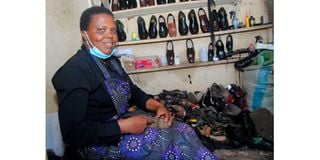Teacher turned cobbler: I’m satisfied with my new-found job

Ms Gladice Kerubo Kinara, 42, at her shoes shop in Elburgon, Nakuru County in this photo taken on July 13, 2021.
What you need to know:
- With no teaching job forthcoming, Kerubo begun to take an interest in the art of making and repairing shoes.
- Aware that she works in a profession dominated by men, she is grateful for clients who encourage and motivate her.
Gladice Kerubo, a teacher, had taught for 13 years when the 2007/2008 post-election violence forced her out of her job. At the time, she was teaching in a primary school in Kapsabet, Nandi County but when the chaos erupted, she fled the area, joining her husband, a shoe-maker, in Elburgon, Nakuru County.
Her husband would relocate to Nairobi the same year she moved Elburgon, leaving his workshop in the hands of Ms Kerubo’s cousin, Moses Arasa, a shoemaker. With no teaching job forthcoming, Kerubo begun to take an interest in the art of making and repairing shoes.
“I started watching my cousin at work, and would ask him lots of questions regarding what I observed him do,” she says.
Sensing that her curiosity went beyond the simple need to know, Arasa went out of his way to answer her questions. Within a year, Kerubo could not only repair shoes, she could also design and cut the leather that was used to make new shoes.
Wearing a dust coat, we find her busy at work in her small workshop, which opens at 7am and closes at 7pm.
She says that she does not regret leaving teaching behind.
“In this business, I engage one client at a time, who is easier to manage compared to the big number of pupils I would attend to at any given time, not to mention the parents,” she explains.
She praises her cousin for being a good teacher and encouraging her to give the job her best.
The two source the materials they need from Nakuru and Nairobi, explaining that the prices in these areas are more affordable compared to what their locality has to offer.

Aware that she works in a profession dominated by men, she is grateful for clients who encourage and motivate her and who show confidence in her ability to do a good job.
“But there are those who believe that this job is done by illiterate people, for instance, once, a client who had been accompanied by his child warned him that he would end up doing “dirty work” like mine if he did not work hard in school,” she says, pointing out that some people don’t appreciate skills like hers, even though they need them.
Other clients, she says, can be inconsiderate, presenting dirty, or even muddy shoes for repair especially during the rainy season. Since they need the money, in such cases, they clean the shoes themselves before repairing them.
There are also those that take their shoes for repair but fail to go back for them. Eventually, they are forced to dispose the pile of uncollected shoes to make room for others.
Kerubo attributes her new-found skills to commitment and willingness to learn. Her mentor, Arasa, observes that she loves her job, which has made it easier for her to learn the skills required quickly, adding that she is hard-working.
Kerubo urges the county government to offer more support to small-scale traders and consider giving individual loans rather than strictly lending to groups.
She also believes that revival of the tannery which was shut down some years back would make businesses like hers more profitable, easier and cheaper to run due to availability of raw materials.
“This sector would become more robust if shoe-making courses are introduced in Technical and Vocational Training Institutes which are spread all over the country,” she says, adding that she envisions owning an institution which will enable her to pass on her skills, in the process creating employment for youth.





